
Issue #: 158
Published: March / April 2018
- Price per issue - digital : 6.20€Digital magazine
- Price per issue - print : 8.50€Print magazine
- Access to Multihulls World digital archives Digital archives
We have been following Olivier and his family on their world tour, and they have just arrived in Asia. It was a particularly complicated stopover from an administrative point of view…
Approaching the south-western tip of the island of Timor, the wind was blowing at a steady 25 knots, which was not ideal for us. The small channel which separates Timor from the island of Semau was full of fishing boats, which made passing through at night much more complicated. We tried to hold our position about 20 miles out, but kept drifting off at around 3 knots. I decided to get a couple of hours sleep, and then with the situation still uncomfortable, unfurled a bit of sail and headed for the strait. The night was pitch black, and when we saw the tip of Timor whilst still sailing close-hauled, Marin and I saw a more or less continuous barrage of fishing boats that were working under lights. This depressing situation put pressure on the crew of Jangada, as we didn’t know what kind of set up these boats were working with and the strait was only a few short miles wide. With my skipper’s hat on, thinking of all the potential crises that could arise, I imagined us having to make tricky, last minute manœuvres, nets getting caught in our skegs and propellers, and some angry Indonesian fishermen shouting at us in the night…
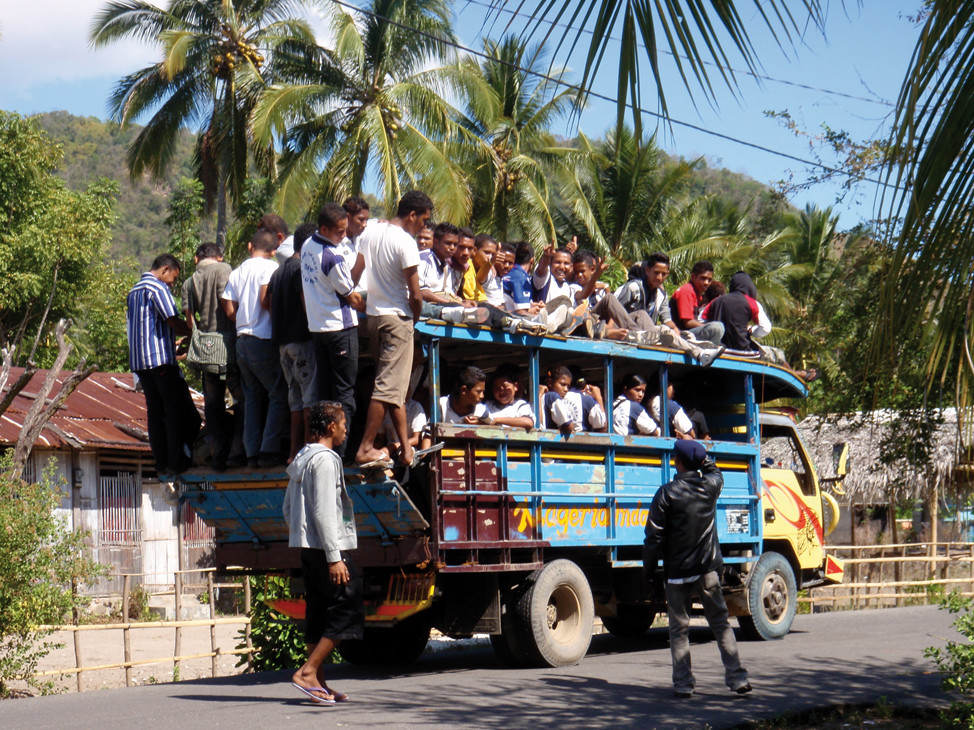
The only reassuring thing was that the electronic charts seemed to be reliable. As a precaution, we lowered the mainsail, unfurling the solent halfway and started both engines so that we would be able to react immediately. For once, we had all our lights on, as I felt that with their powerful « lamparo » spotlights, the fishermen probably wouldn’t see anything beyond a small zone around them. As is usually the case, the eyes and the brain soon get a handle on the situation, and things started to move forward. We put our hand held spotlight on charge and switched it on, up on the bridge, and between my son and I, we tried to avoid a collision, navigating past each boat. I love experiencing this type of moment with my son, as it really helps to bond us. This is the unbreakable bond that I’d hoped to forge with my children on this journey… We came through this test pretty much unscathed, and the electronic chart showed our route heading off north. I had quaffed several hot soups and strong coffees during the ordeal, to keep my senses sharp despite the late hour. Aromas from the land wafted across the sea. It was 3 or 4 hours before we left most of the craft behind us. Approaching the northern exit of the strait, the lights of Kupang were like a white halo, which helped to guide us. We slalomed around a few cargo ships at anchor, sailed past other commercial boats that were poorly lit and had spluttering engines, before arriving in a zone where we could potentially anchor until daylight. I spotted a military launch at anchor and sailed towards it to moor up. I was thinking of all the potential dangers that Asia could offer… The stench from the town with its very particular bouquets attacked our nostrils. A motor pirogue flashed right by us at full speed in the dark. It was 3am! We had left Port Moresby 9 days previously. Welcome to Indonesia !

The muezzin (call to prayer), followed an hour later by the sustained hum of the traffic woke me up early. I was able to discover Kupang. It was a village which resembled some of the fishing villages on the Atlantic coast of Portugal: grubby concrete houses with sheet metal roofs, and rocky cliffs encircling small beaches which turned out to be unbelievably dirty. Timor became known to the West because of its sandalwood at the start of the 16th century. From 1650, the Portuguese fought over Kupang with the Dutch of the Dutch East India Company. Afterwards the Portuguese based themselves in East Timor, with the Dutch in the west of the island.
Today, Kupang is full of life, although our first impressions of Indonesia are colored by the more unappealing local traits: the constant noise of the ubiquitous motorbikes and the consequent air pollution; the disgusting smells coming from drains and open dumps. There is all sorts of trash everywhere, with unsurprisingly, various types of plastic packaging being the most common… On top of all that, the anchorage off Kupang was in waters of an indescribable color, although whatever it was it was disgusting with all the bags and bottles floating around. And all of this was serenaded by the call to prayer from 4.30am (although eastern Indonesia is majority Christian rather than Muslim). The anchorage wasn’t very sheltered and was buffeted by the thermal breeze which starts to pick up quite seriously from mid-morning. We start to realize that the only reason that we are making a stopover here is to get our entry formalities into Indonesia over with. It’s well known amongst long haul sailors that this is not a straightforward activity.
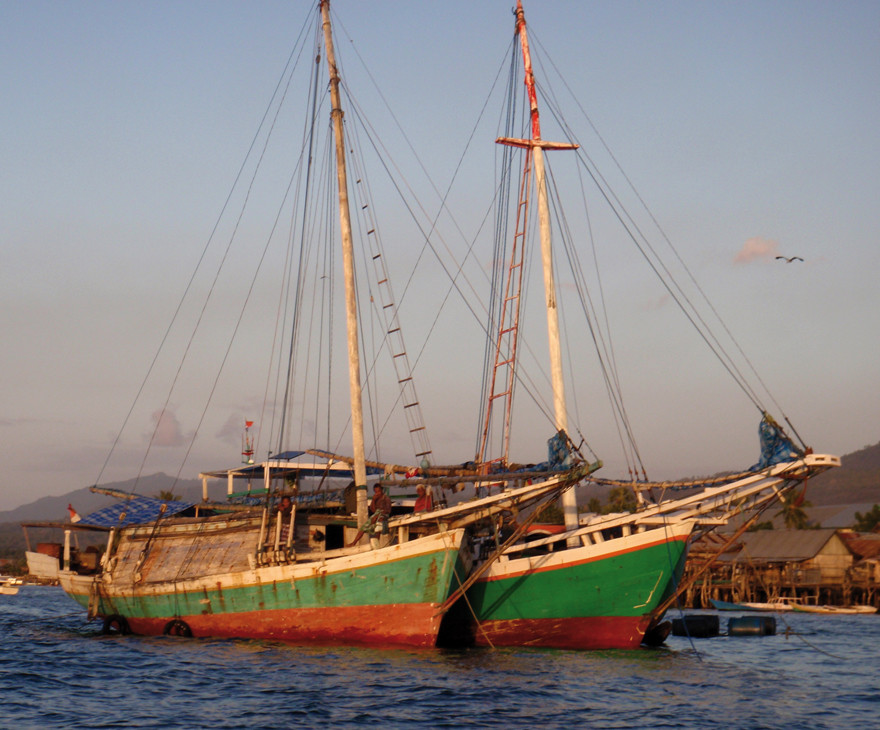
There’s a slight difference with Papua New Guinea where civil servants are sometimes corrupt. Here it is everywhere, institutionalized even. There would be no point trying to get around it. Here the aim is slightly different: it’s all about getting the necessary papers for cruising around Indonesia as quickly as possible and at the lowest price. It’s just another challenge which I’m definitely up for! These administrative difficulties, along with a lack of a proper cruising guide, inaccurate charts and a fear of piracy in Indonesian waters, leads most boats to join the Sail Indonesia rally, which leaves Darwin in Australia at the end of each July, heading for Kupang on Timor, with various stopovers in the Indonesian archipelago (organized with the Indonesian government), as well as to Singapore, Malaysia and Thailand. However, on Jangada, we don’t do organized rallies with their feeling of a chatty, nautical transhumance. Not to mention the frequent “potluck” meals, whether improvised or not. No we prefer to head off the beaten track!

For the crew of Jangada, the Indonesian formalities had begun 2 months previously on Vanuatu. We had sent an email to a specially nominated agent in Jakarta requesting a sailing permit or C.A.I.T (Clearance Approval for Indonesian Territory). This is an indispensable document if you want to sail in Indonesian waters. This was accompanied by a Western Union transfer for 1,850,000 Indonesian rupees (around €160) which we did in Port Vila. This was because our stay was to be shorter than two months. Any longer and we would have needed a letter from a sponsor and 350,000 rupees more. The procedures for getting the visas were carried out in Port Moresby. In Jakarta, getting hold of the CAIT went well, and as agreed with our agent in situ, the document signed by the Ministries of Defence, Foreign Affairs and Indonesian Transports, was waiting for us at the office of the local Kupang agent, a certain Napa Rachman, a person that you cannot avoid when you arrive in this part of the world. You can’t even put one foot on a rubbish-strewn beach in Kupang without one or two of Napa’s henchmen helping you in the direction of the Lavalon, the dive bar which doubles up as Napa’s meeting point with his clients. Napa sees himself as the official corrupter in chief for the authorities in Kupang. His henchmen have now also become hunters, as the area of Napa’s business has recently seen the arrival of a competitor, a certain Domingus. He would appear to be a drug kingpin, probably encouraged by the corrupt local authorities with a view to pushing up prices! That at least is my take on the situation. Of course Napa and Domingus hate each other, and it wouldn’t in the least surprise me if one day one of them was found with their throat cut in one of the town’s open sewers… For a new arrival, the first thing is to choose your side: Napa or Domingus.
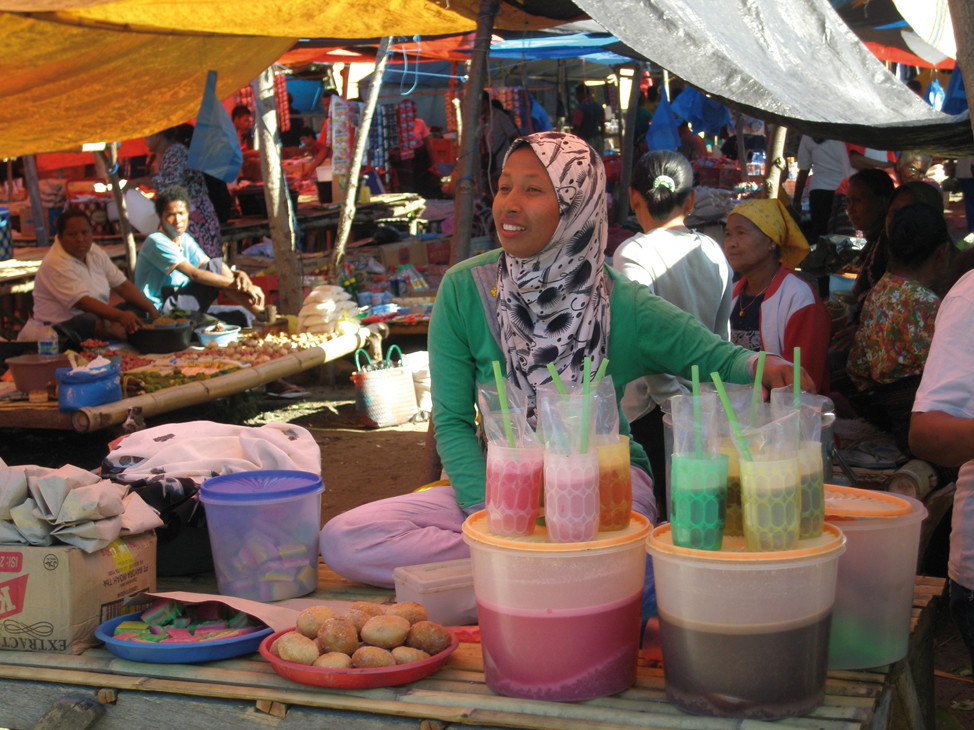
However, you mustn’t make this known before the end of the negotiations over the cost of the “service” which will be paid to the corrupter in chief. This cost will include the corrupt money which will be paid by the “agent” to the relevant “service providers”, as well as his own remuneration. I had done my homework in advance and had checked up on the internet. I chose Napa because he worked with our agent in Jakarta who had been straight with us up until now, and also because he had been there the longest. I had informed Napa of our arrival via an email 48 hours previously. He was nervous that I would go to his rival and when I meet him in the Lavalon, Edwin’s dive bar, he is visibly relieved to see me. His happiness is no doubt based upon the thought of all those lovely Australian dollars… Despite all this I didn’t have a problem with Napa. Within 36 hours he had done a perfect job for us, meaning that we had no procedures to do and there would be no visit on board. It’s good work but it has to be paid for. Those people who are shocked by this situation and have tried to avoid this official corruption and go directly to the authorities have found themselves being sent back to the “agents” in no uncertain terms, and never received their entry papers for the country.

Obviously you need to lay a marker down with Napa right from the start. When I met him for the first time at the Lavallon over my first Bintang (Indonesian beer) he started out by trying to get 100,000 rupees out of me for handing over the original of the C.A.I.T which had been sent by Lytha, his associate in Jakarta. Even though this service had already been paid for by the Western Union money transfer… I burst out laughing, which disarmed Napa somewhat, and I mentioned that he was much talked about on the internet, although I didn’t go into the details. I had also mentioned to him when informing him of our arrival that I would only need him to hand over the C.A.I.T. which would have had him wondering whether I would be going to use him for the other services… Napa was therefore worried that I would go to his rival, which I thought could be a good thing. He also shouted at me for not having warned him of our exact arrival time in the bay. This meant that he would have probably had to pay some of his henchmen a few hundred rupees to keep an eye out for us. So in this case, Napa had to be happy with the minimum union rate for a corrupter, as I had taken the initiative in the negotiation. And with the laugh of a sailor who was used to port bars, I gave him a great big friendly slap on the back: he understood that there wouldn’t be any supplement for the C.A.I.T and I managed to negotiate a price of 100 Australian dollars for the other services, which was a good price given that many people often paid double. Napa tried to convince me that I was paying a pittance and that there would be nothing left for him. I was slightly apprehensive handing the original of the ship’s license and our four passports over to him, but there was no alternative. Everything was alright though, and I recuperated the stamped documents the next day at the Lavalon over a ginger tea…
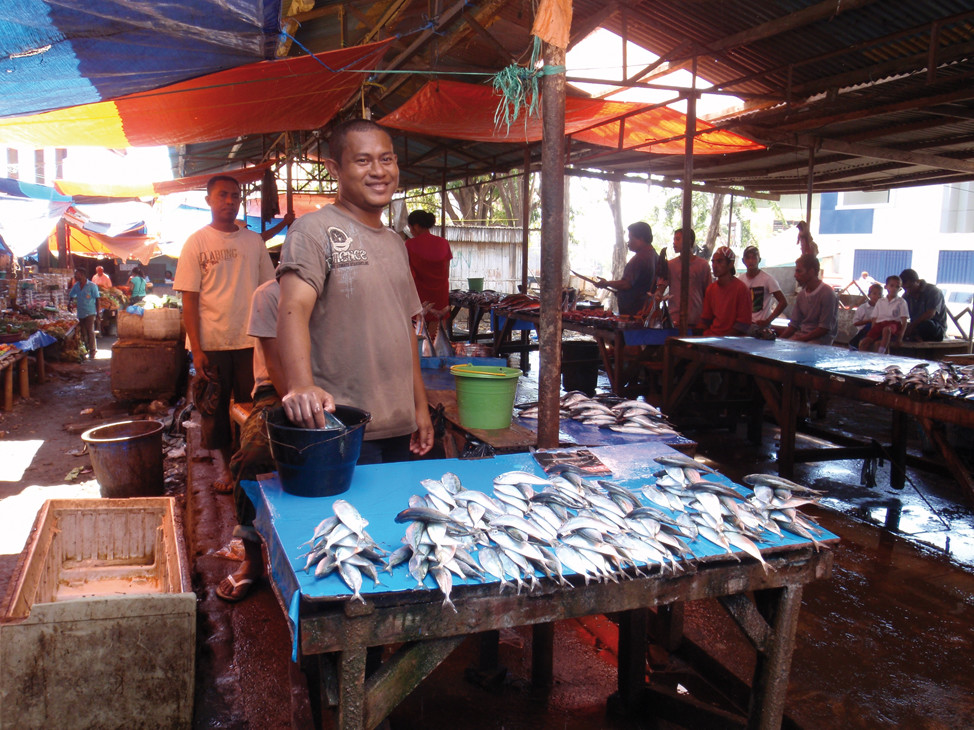
At the Lavalon, Edwin told us where we could do our shopping, and we jumped in the first bemo that came along. These drive around hundreds of Indonesian towns, and are 10 seater minibuses which are a bit tight for me although I managed to slide in. Massively overdecorated, with the sound system going full blast and driven by youngsters (15/18 years old) who work as a team: The driver who must have been born with a car horn in his hand, who will be deaf by the age of 30 and dead from lung cancer by 40, and his partner who spends the day on the footboard along the side of the vehicle with the door stuck open, hailing clients and helping to get the vehicle started after one of the frequent, inevitable moments when the motor cut out. In town there is just one price: 2000 rupees (around €0.20) whatever the distance. We left the Chinese mini-market laden with stuff. Not far away I found some engine oil made in Singapore. I was planning on doing an oil change on the engines, and I even found demineralized water for the batteries. But with the four of us and 30 kilos of purchases, a standard bemo wouldn’t get us back to the seafront. A security guard outside a bank, armed with a pump-action shotgun decided to help us. He spoke a few words of English (which was unusual in Indonesia, at least in the Sunda islands), and sorted us out with a bemo that was passing by and empty which was a rare occurrence. We got back to the dinghy which had been pulled up on the beach on its wheels. We’d left it under the watchful gaze of a one-legged down and out who was an informer and henchman of Napa. As we left Kupang we gave him 10,000 rupees.
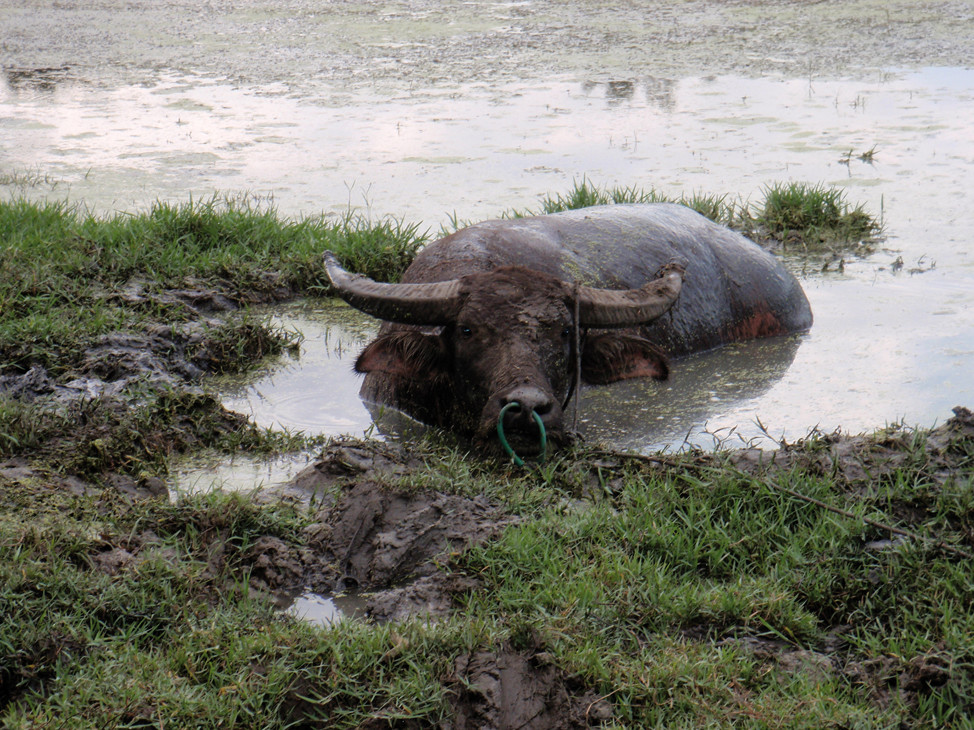
Our final task in Timor was to go and get our hair cut in a tiny salon, run by a young, pretty Indonesian girl, who moved her friends out of the way so that we could sit down. The first up was a less than reassured Marin, who made an awful face. Like me, he hates getting his hair cut! But to top it all, it’s a women’s salon and he’s surrounded by a bevy of young girls who don’t speak a word of English, and who are constantly making incomprehensible comments regarding his nice physique! Barbara was obliged to try and calm down our furious teenager, but it was tough going. Waiting patiently, I was up next. The woman nearly shaved my head! Barbara loved it, but I hated it. I was surprised that she gave me a head massage after my cut and not before. Vive la difference! Adélie, surprisingly, went after me. She hates the way people are interested in the thickness of her wavy blond hair, and in Indonesia especially, where straight, dark brown hair is the norm. I left the lady the huge sum of 75,000 rupees, or 25,000 per cut as we had agreed (a bit more than €2), and it was nice to see her so happy to have had these unexpected western clients.
We were not too sorry to leave our anchorage in Kupang the next day.
With our documents in our pockets, our mission was accomplished. We were now heading north to Lembata, our first island in the Sunda archipelago…
What readers think
Post a comment
No comments to show.